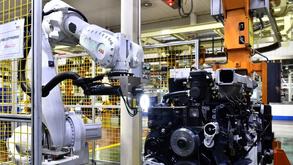 Robotic arms assemble engines on an assembly line at a workshop of the Weichai Power Co, Ltd in Weifang City, east China's Shandong province, April 22, 2021. (GUO XULEI / XINHUA)
Robotic arms assemble engines on an assembly line at a workshop of the Weichai Power Co, Ltd in Weifang City, east China's Shandong province, April 22, 2021. (GUO XULEI / XINHUA)
BEIJING - The purchasing managers' index (PMI) for China's manufacturing sector came in at 50.1 in January, down from 50.3 in December 2021, data from the National Bureau of Statistics (NBS) showed Sunday.
A reading above 50 indicates expansion, while a reading below reflects contraction.
In January, the sub-index measuring purchase prices of major raw materials rose 8.3 percentage points from December 2021 to 56.4
Expansion of the industry slowed in January as some sub-sectors entered a traditional off-peak period and market demand contracted, said NBS senior statistician Zhao Qinghe.
In January, the sub-index measuring purchase prices of major raw materials rose 8.3 percentage points from December 2021 to 56.4. The sub-index for prices at the factory gate was 50.9, up 5.4 percentage points from last month.
The sub-index for production reached 50.9, down 0.5 percentage points from last month but has remained in the expansion area for three consecutive months.
ALSO READ: China's manufacturing PMI rises to 50.3 in December
The new order sub-index decreased 0.4 percentage points to 49.3, pointing to shrinking demand in the manufacturing market.
Manufacturing companies' confidence was on the rise, with the sub-index for production and operation activity expectations at 57.5, up 3.2 percentage points from last month.
Sunday's data also showed that the PMI for China's non-manufacturing sector came in at 51.1 in January, down from 52.7 in December.
Affected by the sporadic resurgence of COVID-19 cases recently, the sub-index for business activities in the services sector stood at 50.3, down 1.7 percentage points month on month.
The January PMI indicated that domestic demand is still insufficient and the economy is under downward pressure, said Wen Bin, the chief analyst at China Minsheng Bank.
ALSO READ: PMI low, but biz mood upbeat
The country should maximize the use of cross-cyclical adjustment in its macroeconomic policy, boost market confidence and further expand domestic demand to ensure the economy runs within a reasonable range, Wen said.
Chinese authorities have underscored "triple pressure" on the economy currently -- shrinking demand, supply shocks and weakening expectations.
The tone-setting Central Economic Work Conference held last month repeatedly stressed "stability" as the top priority for the nation's economic policies in 2022.


